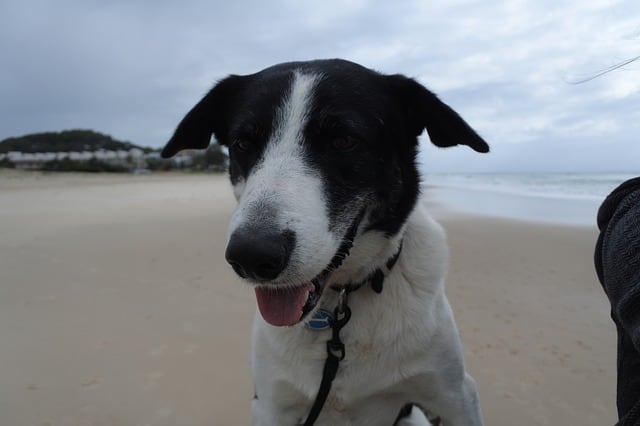The sassy, alert and active border collie is a live-to-work and aims to please kind of breed.
These are medium-sized dogs ranging from 30lbs to 55lbs of energy and stamina to herd and round up sheep efficiently and quickly with their speediness and icy “stare.”
These dogs work so effectively, and independently, that they are placed consistently as number one on lists of the smartest dogs in the world!
The border collie is mainly a healthy breed but can be susceptible to a few health conditions such as epilepsy, hip dysplasia, and a few eye conditions. They are also prone to allergies, which are mostly food-related.
In the following post will be information on common border collie food allergies as well as answering the question, “What can border collies not eat?”

For your dog’s vitamin supplement, foods, toys, or other dogs product please visit the Health Extension website.
Can Dogs Have Food Allergies?
Centuries ago, dogs hunted for food or ate whatever their owners gave them and before the multitude of dog foods available on the market, most likely their diet was leftover table scraps, a big “no-no” for today’s dogs.
Whether dogs had allergies years ago, no one knows, but dogs were not pampered like today’s canines. Many were working dogs which were responsible for farmers’, ranchers’, and hunters’ livelihood and survival, they rarely saw a veterinarian, unless in an emergency.
Today, dogs can and do develop allergies and many are to the very foods they eat. Most pet food companies offer all-natural, healthy dog foods, but years ago, canine kibble and canned food contained a vast variety of just plain junk and leftover scraps, a downright unhealthy mix. This could be the reason there are so many dog food allergies today.
Dogs, like wolves, being carnivores, were meant to eat raw meat and bones as the main component of their diet.
Some owners today do feed their dogs a “raw” diet and there is proof that it is healthy, giving their dogs energy, optimal health, nutrition, and shiny coat, all without allergic reactions.
Even though dogs today are fed high-quality pet foods without fillers and additives, they still develop food allergies, because it is now hereditarily in their makeup.
Food Intolerance or Allergy?
If your border collie has a food intolerance, which in fact is a sensitivity to a certain food, most often the response is vomiting, gas, and diarrhea.
An intolerance involves the gut without the involvement of the immune system. Most often, these symptoms come on within a few hours of eating the intolerable food.
Many humans suffer from lactose intolerance, which is a sensitivity to the lactose or milk sugar in milk.
Dogs shouldn’t be given milk or ice cream because they generally do have an intolerance to dairy foods… A dog’s digestive system is really not designed to eat and digest dairy. If the offending foods are avoided, no tummy upset will occur.
A true food allergy, on the other hand, is the immune system’s response in a hypersensitive way toward a normally harmless substance.
In food allergies, symptoms can be mild or severe, developing instantly or over time and gradually escalating.
To check your Border Collie’s health status or their DNA checks, please visit the Embark vet website for all the help you may need.

Symptoms of Food Allergy in Border Collies
There are many symptoms of a food allergy that your border collie may develop. Symptoms are listed below
- Sneezing
- Red, swollen eyes
- Discharge from eyes
- Swollen face
- Itchy skin
- Dry flaky skin
- Itchy paws
- Scratching
- Oily skin
- Red or Oozing sores
- Rashes
- Hot spots
- Yeast or bacterial skin infections
- Itchy ears
- Ear infections
- Skin becomes pigmented
- Hair loss
- Diarrhea and/or vomiting
If your border collie develops food allergies, they may suffer from any or all of the above symptoms with each becoming worse each time they ingest the offending allergen.
Keep in mind that generally, one main difference between food allergy and food intolerance symptoms is that intolerance shows digestive symptoms without any skin issues.
Common Border Collie Food Allergies
Allergies in your border collie can be caused by many triggers, but more common allergies found in dog foods are listed below.
- Wheat
Many human food labels say “gluten-free” and if you take notice, more and more pet food labels are cropping up that say the same.
Although it is more common for dogs to have allergic reactions from a protein in foods, carbohydrates, such as wheat can cause allergies as well.
- Dairy
dairy – Again, many humans have lactose intolerance to certain dairy products, mainly milk, some cheese, and ice cream. This is not a true allergy.
Dogs can also have a dairy intolerance. The problem is lactose intolerance and a true dairy allergy often has the same symptoms of gas, diarrhea, and vomiting.
The difference in diagnosing, however, is a dairy allergy will also present with many of the skin symptoms of allergies.
- Eggs
eggs – With egg allergies, it will be the protein in the yolk of the egg that will cause reactions. If you are sure that eggs are the offending allergen, don’t feed your collie any eggs and check all dog food and treat labels for eggs as an ingredient.
- Soy
Check labels and if you can avoid soy products, regardless of allergies, it may be best to do so.
Research has shown that soy consumption can cause more than just allergies. Dogs may also develop liver, thyroid, and reproductive problems from eating soy.
- Chicken, Beef, Lamb
chicken, beef, lamb – Proteins are the most common and major contributors to the cause of food allergies and all of these meats are proteins.
Unfortunately, feeding your border collie the same protein source for years can up their chances of becoming allergic to it.
Chicken, beef, and lamb are the three most common ingredients in canine foods that cause allergies, beef being the biggest offender.
Alternating protein sources from time to time is an option for avoiding allergies or choosing fish or venison as the protein base.

Eliminating Food Allergies
While you will never fully eliminate dog food allergies, identifying the allergen and changing dog foods will eliminate symptoms.
Identifying the allergy trigger may be the hard part. Sometimes it’s easy if symptoms come on suddenly after you’ve given them new food.
Other times, both you and your veterinarian may have to join forces to solve the mystery.
There are blood and skin allergy tests your veterinarian can perform, but they aren’t always accurate.
Often, eliminating their diet completely and starting from scratch with totally new and different food is the only solution.
There are many wonderful hypoallergenic dog foods out there with limited ingredients for less chance of allergies.
what Cam Border collies Not Eat
There are many healthy and safe fruits and vegetables that your border collie can eat for snacks, extra nutrition, and spicing up their everyday kibble. Be sure to check in with your veterinarian or do some research to see which are safe.
Many foods are unsafe and even poisonous for dogs, making them sick with some and eaten in large quantities, causing death.
Some listed below you wouldn’t think of feeding your pup, but these are ones they may steal out of a candy dish, hoover off your counter, or even out of your purse, so be vigilant.
- Grapes
- Raisins
- Citrus fruits
- Onions
- Garlic
- Alcohol
- Xylitol (found in sugar-free gum and candy, can cause death)
- Nuts
- Milk
- Ice cream (dogs cannot digest dairy products as we can)
- Avocado
- Coffee
- Chocolate
- Salt and salty snack foods
Allergies may never be a part of your border collie’s future, but when feeding your Collie, choose a high-quality nutritious food, but one with minimal useless ingredients.
Too many fillers and artificial ingredients that are unnecessary are not healthy and only make it harder to identify an allergen if they do have a reaction.
Purchase dog treats that are with more natural and wholesome ingredients. Treats can also be a source of allergies not to mention adding excess weight to your border collies.
If you notice any of the signs or symptoms in this post and these seem to be linked to their food, check in with your veterinarian before things get out of hand.
